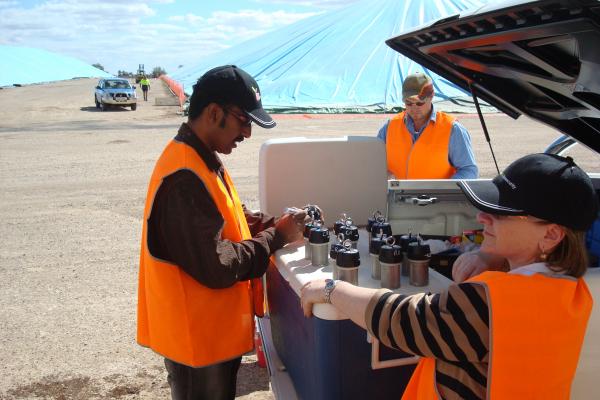CRC30065: Resistance monitoring and management of stored grain insects in the northern region
A range of grain storage pests including beetles, psocids, moths and mites habitually threaten the food safety, market access, trade and the overall profitability and sustainability of the Australian grain industry. Some of these pests have been detected with resistance to phosphine and currently registered contact insecticides (grain protectants) and the spread of resistance is on the rise annually.
Research outcomes:
- Early warning of the emergence of new insect resistances and the spread of known resistance to grain protectants and fumigant phosphine.
- Contribution to the development of strategies to control or limit the spread of resistant insects.
- Maintenance of market access for Australian grain growers.
Research highlights:
The project has been completed with all project milestones achieved on time. During 2007-08, a total of 632 insect samples collected from 115 farms and 150 bulk storages were tested for resistance to phosphine and key grain protectants. The insects comprised of the major pest species: lesser grain borers, flat grain beetles, rice weevils, rust-red flour beetles, saw-toothed grain beetles, psocids and moths. The overall result suggest that the development of resistance to the currently registered grain protectants and fumigant phosphine is a serious issue threatening the profitability and market access of our grain industry.
While the overall frequency of weak resistance to phosphine remained high in lesser grain borers, rust-red flour beetles and rice weevils, the detection of strong resistance in several populations of flat grain beetles has become the emergence resistance issue. This resistance has also been detected by the collaborating researchers in the Southern region (NSWDPI, led by Dr Joanne Holloway). The level of this resistance is high and in response the CRCNPB has initiated a project titled 'Fumigation protocols for the strongly phosphine resistant flat grain beetles' in consultation with end users.
Among the key grain protectants tested, fenitrothion was found to control all strains of rust-red flour beetle, rice weevil and flat grain beetle without any resistance, whereas 60-80% of strains of lesser grain borer were detected with resistance to deltamethrin and s-methoprene. The industry is waiting for the registration of spinosad which will be used particularly to control resistant lesser grain borers.
Research implications:
The evolution of resistance to phosphine and key contact insecticides for the post-harvest protection of grain seriously jeopardises market access for Australian product. There is a need for both strategic and tactical information on the presence/absence and trends in resistance to phosphine and key contact insecticides to underpin resistance management in the grain industry.
Who are the end-users?
Grain growers, bulk handlers, merchants, food processors, flour millers, maltsters, lot feeders and cereal manufacturers.
Acknowledgements
The research team expresses sincere thanks to the managers and field staff of GrainCorp for their support and help for accessing storage sites for collection of insect samples.

Publications for this project
PROJECT LEADER

Dr Manoj Nayak
Project Leader CRC30065: Resistance monitoring and management of stored grain insects in the northern region
manoj.nayak@deedi.qld.gov.au
Phone: 07 3896 9431
Fax: 07 3896 9446
Read More
PROJECT DETAILS
Complete




